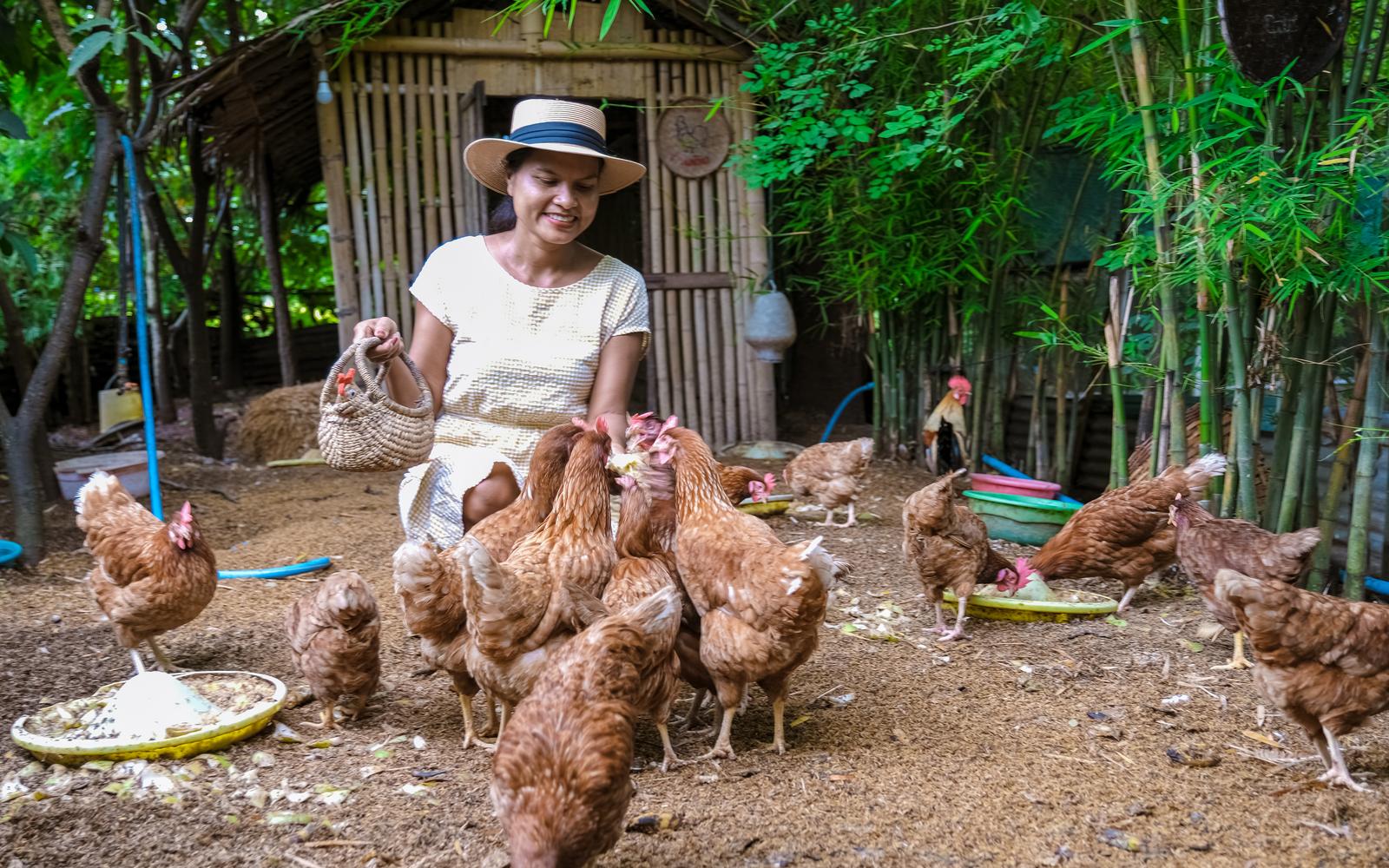Chickens are often one of the first forms of livestock that people start out with on their homestead as a source of eggs, meat, or both. Many people throw out kitchen scraps for their chickens to eat, but can they eat all kitchen scraps? Can chickens eat cheese?
Chickens can eat cheese, but the amount of cheese, type of cheese, and condition of the cheese must be taken into account. Chickens cannot eat salty cheese or moldy cheese and should only be given limited quantities of cheese to prevent diarrhea in the birds.
Feeding cheese to chickens is a “yes and no” answer because there are cautionary measures you should consider before including this dairy product in your chickens’ diet. We will discuss whether cheese is safe for chickens, offers any nutritional value, and the potential risks of allowing your birds to eat cheese.
Is Cheese Good For Chickens?
Raising chickens for meat and their eggs is a staple on most homesteads. As a result, many chicken owners are curious about what food scraps they can safely feed their flocks and whether cheese is a safe or toxic option.
While giving your chickens any food scraps you have on hand may be tempting, it’s important to remember that chickens have specific nutritional needs that must be met to keep them healthy.
Chickens require a balanced diet that includes protein, carbohydrates, fats, vitamins, and minerals to keep them healthy, productive, and able to fight off disease.
Most of these dietary needs are provided by the vegetative diet of plants and seeds that the flock eats, as well as bugs such as worms and grubs they scratch up from the soil or find on plants.
Can cheese supply some of these dietary needs for your chickens?
Does Cheese Have Nutritional Value For Chickens?
Cheese is a good source of protein, calcium, and phosphorus, all of which are important for chickens. For example, cheddar cheese contains around 25 grams of protein per 100 grams, making it a good source of this essential nutrient.
Cheese also contains fat, which can be beneficial in small amounts. However, it’s important to remember that cheese is typically high in fat, so feeding it to chickens in large quantities can lead to health problems.
Feeding cheese to chickens in moderation can provide them with additional protein, calcium, and phosphorus, supporting their growth and egg production. Cheese can also be a good energy source for chickens, as it contains carbohydrates.
While there are nutrients in cheese that can benefit chickens, some cheese components can be detrimental to their health.
Risks Of Feeding Cheese To Chickens
While cheese can provide some nutritional benefits to chickens, there are also potential risks associated with feeding it to them. Here are some risks to consider before feeding cheese to your chickens.
- Difficulty in digesting lactose. Chickens do not digest lactose very well, and feeding them too much cheese can cause digestive problems such as diarrhea and bloating.
- High-fat content in cheese. Feeding chickens too much cheese can lead to obesity and other health problems.
- Sodium content in cheese. Some types of cheese can be high in sodium, which can harm chickens in large quantities. Too much sodium can cause dehydration, diarrhea, kidney failure, and other health problems.
- Potential for choking and digestive issues. Feeding chickens large pieces of cheese can increase the risk of choking, especially if they are not accustomed to this type of food. Cheese can also be difficult for chickens to digest, especially if not cut into small pieces or mixed with other foods.
How To Feed Cheese To Chickens Safely
If you decide to feed cheese to your chickens, it’s important to do so safely and responsibly.
We have compiled some guidelines to help you feed cheese to your chickens safely without running the risk of causing them any health issues.
- Feed cheese to chickens in moderation. It’s important to feed cheese to chickens in moderation, as with any food not typically part of their natural diet. Too much cheese can lead to health problems such as obesity and digestive issues. Limiting cheese to a small amount as a treat is recommended rather than including it in their daily diet.
- Cut cheese into small pieces. Cut cheese into small pieces before feeding it to your chickens to reduce the risk of choking and digestive issues. This will also make it easier for them to digest. Finely grating the cheese is a good option.
- Mix cheese with other foods. Mixing cheese with other foods can ensure the chickens do not eat too much cheese at once. So don’t throw out handfuls of cheese for your chickens to feast on; this is a problem waiting to happen.
- Monitor your chickens’ health. After feeding your chickens cheese, monitor their health for any signs of digestive problems or other health issues. If you notice any problems, stop feeding them cheese immediately and consult a veterinarian if necessary.
Feeding cheese to chickens can provide some nutritional benefits, but it’s important to do so in moderation and with caution. By following these tips, you can safely incorporate occasional cheese treats cheese into your chickens’ diet as a nutritional treat.
What Cheese Should You Avoid Feeding To Chickens?
Not all cheese is suitable for chickens to eat due to the differences in the way the cheese is made and the ingredients included in the cheese.
The top cheeses to avoid feeding your chickens are as follows.
- Highly processed cheese.
- Very salty cheese.
- Cheese with high-fat content.
- Old moldy cheese.
On the last point, the mold in blue cheese is a particular bacteria that is good for chickens, but old cheese that has gone moldy is not the same bacteria and should not be fed to your chickens.
Blue cheese is a high-fat cheese, often with high-fat content, so it should be given to your chickens in very small quantities.
Can Chickens Eat Mozzarella Cheese?
As discussed earlier, cheese can provide some nutritional benefits to chickens if fed in moderation and with caution. But what about mozzarella cheese specifically? Let’s look closer at this popular cheese and whether it’s safe for chickens to eat.
Mozzarella cheese is a type of cheese that is made from the milk of cows or water buffalo. It is a good source of protein, calcium, and phosphorus, all of which are important nutrients for chickens.
Feeding mozzarella cheese to chickens in moderation can give them additional protein, calcium, and phosphorus. Mozzarella cheese can be cut into small pieces and mixed with other foods to create a nutritious and tasty treat.
As with any type of cheese, there are potential risks associated with feeding mozzarella cheese to chickens. These include diarrhea due to lactose intolerance, high fat, and high sodium content.
To feed mozzarella cheese to chickens safely, feed it in moderation, cut it into small pieces, mix it with other foods, and monitor your chickens’ health.
Can Chickens Eat Parmesan Cheese?
Parmesan cheese is a hard, aged cheese typically made from cow’s milk. Like other types of cheese, it can provide some nutritional benefits to chickens if fed in moderation and with caution.
Parmesan cheese is a good source of protein, calcium, and phosphorus, all of which are important nutrients for chickens. It also contains small amounts of vitamins A, D, and B12.
Feeding Parmesan cheese to chickens in moderation is not a problem as long as the quantities are small and infrequent. Parmesan cheese can be grated into small pieces and mixed with other foods to create a nutritious and tasty treat.
One of the main risks of feeding Parmesan cheese to chickens is the high salt content in the cheese. While chickens need some salt in their diets, too much can trigger diarrhea, digestive problems, and kidney failure.
To feed Parmesan cheese to chickens safely, follow the same tips outlined earlier for feeding cheese to chickens. Feed it in moderation, cut it into small pieces, mix it with other foods, and monitor your chickens’ health.
Conclusion
Chickens can eat cheese, including mozzarella and Parmesan cheese, as long as it’s fed in moderation and with caution. Cheese can provide some nutritional benefits to chickens, such as protein, calcium, and phosphorus. However, it’s important to be aware of the potential risks associated with feeding cheese to chickens, including lactose intolerance, high-fat content, and high sodium content.
It’s also important to keep in mind that cheese should be used as a treat or supplement to their regular diet rather than as a primary source of nutrition. Sticking to these basic rules will allow your chickens to enjoy their occasional cheesy treat safely!
References


